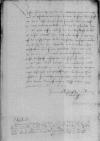Den ersamen, namhafftigen hern ⌊burgermeister und radt[mannen] der koniglichen stadt Danczke⌋, [unsern] [gunst]tigen freunden.
Unsern fruntlichen grues mit erbittung, was wir liebs und wolgefallens vormugen, zuvoran. / Ersame, namhafftige hernn, besundre, gunstige freunde. /
Wie es negst zw ⌊Marienburg⌋ vorbliben / und was do gehandelt, / hot Ewer Erbarkeit gutt wissen. Und so dan die botschafft an ⌊konigliche majestet⌋, unsern allergnedigsten hern, / ouch andre briffe hie bey uns uff der unschuldigen kinder tag sollen vorsigelt werden, / dar zw sich die hern voywoden und der andren stet geschickten zuvorfugen gewilligt, / bitten wir ouch hie her aus Ewer Erbarkeit mittel imants zwschicken, / domit unser botschafft ansichtiger und so sunst noch was Ewer Erbarkeit hetten darzw zwlegen, mit eingebrocht mocht werden. Dis hab wir Ewer Erbarkeit, die wir Gotte in langweriger gesuntheit und gelugkseligem zunhemen thun befhelenn, freuntlicher, trewhercziger meÿnung nicht wolt bergen. /
Datum uff unserm slosse ⌊Lobaw⌋, XXI Decembris anno domini 1533.
⌊Ioannes⌋, / bischoff zu ⌊Culmen⌋ etc. manu propria.

